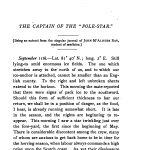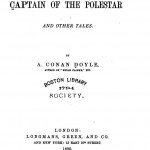September 18th.—Passed a restless and uneasy night, still haunted by that strange sound. The Captain does not look as if he had had much repose either, for his face is haggard and his eyes blood-shot. I have not told him of my adventure of last night, nor shall I. He is already restless and excited, standing up, sitting down, and apparently utterly unable to keep still.
A fine lead appeared in the pack this morning, as I had expected, and we were able to cast off our ice-anchor, and steam about twelve miles in a west-sou’-westerly direction. We were then brought to a halt by a great floe as massive as any which we have left behind us. It bars our progress completely, so we can do nothing but anchor again and wait until it breaks up, which it will probably do within twenty-four hours, if the wind holds. Several bladder-nosed seals were seen swimming in the water, and one was shot, an immense creature more than eleven feet long. They are fierce, pugnacious animals, and are said to be more than a match for a bear. Fortunately they are slow and clumsy in their movements, so that there is little danger in attacking them upon the ice.
The Captain evidently does not think we have seen the last of our troubles, though why he should take a gloomy view of the situation is more than I can fathom, since every one else on board considers that we have had a miraculous escape, and are sure now to reach the open sea.
“I suppose you think it’s all right now, Doctor?” he said, as we sat together after dinner.
“I hope so,” I answered.
“We mustn’t be too sure—and yet no doubt you are right. We’ll all be in the arms of our own true loves before long, lad, won’t we? But we mustn’t be too sure—we mustn’t be too sure.”
He sat silent a little, swinging his leg thoughtfully backward and forwards. “Look here,” he continued; “it’s a dangerous place this, even at its best—a treacherous, dangerous place. I have known men cut off very suddenly in a land like this. A slip would do it sometimes—a single slip, and down you go through a crack, and only a bubble on the green water to show where it was that you sank. It’s a queer thing,” he continued with a nervous laugh, “but all the years I’ve been in this country I never once thought of making a will—not that I have anything to leave in particular, but still when a man is exposed to danger he should have everything arranged and ready—don’t you think so?”
“Certainly,” I answered, wondering what on earth he was driving at.
“He feels better for knowing it’s all settled,” he went on. “Now if anything should ever befall me, I hope that you will look after things for me. There is very little in the cabin, but such as it is I should like it to be sold, and the money divided in the same proportion as the oil-money among the crew. The chronometer I wish you to keep yourself as some slight remembrance of our voyage. Of course all this is a mere precaution, but I thought I would take the opportunity of speaking to you about it. I suppose I might rely upon you if there were any necessity?”
“Most assuredly,” I answered; “and since you are taking this step, I may as well——”
“You! you!” he interrupted. “You’re all right. What the devil is the matter with you? There, I didn’t mean to be peppery, but I don’t like to hear a young fellow, that has hardly begun life, speculating about death. Go up on deck and get some fresh air into your lungs instead of talking nonsense in the cabin, and encouraging me to do the same.”
The more I think of this conversation of ours the less do I like it. Why should the man be settling his affairs at the very time when we seem to be emerging from all danger? There must be some method in his madness. Can it be that he contemplates suicide? I remember that upon one occasion he spoke in a deeply reverent manner of the heinousness of the crime of self-destruction. I shall keep my eye upon him, however, and though I cannot obtrude upon the privacy of his cabin, I shall at least make a point of remaining on deck as long as he stays up.
Mr. Milne pooh-poohs my fears, and says it is only the “skipper’s little way.” He himself takes a very rosy view of the situation. According to him we shall be out of the ice by the day after to-morrow, pass Jan Meyen two days after that, and sight Shetland in little more than a week. I hope he may not be too sanguine. His opinion may be fairly balanced against the gloomy precautions of the Captain, for he is an old and experienced seaman, and weighs his words well before uttering them.
The long-impending catastrophe has come at last. I hardly know what to write about it. The Captain is gone. He may come back to us again alive, but I fear me—I fear me. It is now seven o’clock of the morning of the 19th of September. I have spent the whole night traversing the great ice-floe in front of us with a party of seamen in the hope of coming upon some trace of him, but in vain. I shall try to give some account of the circumstances which attended upon his disappearance. Should any one ever chance to read the words which I put down, I trust they will remember that I do not write from conjecture or from hearsay, but that I, a sane and educated man, am describing accurately what actually occurred before my very eyes. My inferences are my own, but I shall be answerable for the facts.
The Captain remained in excellent spirits after the conversation which I have recorded. He appeared to be nervous and impatient, however, frequently changing his position, and moving his limbs in an aimless choreic way which is characteristic of him at times. In a quarter of an hour he went upon deck seven times, only to descend after a few hurried paces. I followed him each time, for there was something about his face which confirmed my resolution of not letting him out of my sight. He seemed to observe the effect which his movements had produced, for he endeavoured by an over-done hilarity, laughing boisterously at the very smallest of jokes, to quiet my apprehensions.
After supper he went on to the poop once more, and I with him. The night was dark and very still, save for the melancholy soughing of the wind among the spars. A thick cloud was coming up from the north-west, and the ragged tentacles which it threw out in front of it were drifting across the face of the moon, which only shone now and again through a rift in the wrack. The Captain paced rapidly backwards and forwards, and then seeing me still dogging him, he came across and hinted that he thought I should be better below—which, I need hardly say, had the effect of strengthening my resolution to remain on deck.
I think he forgot about my presence after this, for he stood silently leaning over the taffrail and peering out across the great desert of snow, part of which lay in shadow, while part glittered mistily in the moonlight. Several times I could see by his movements that he was referring to his watch, and once he muttered a short sentence, of which I could only catch the one word “ready.” I confess to having felt an eerie feeling creeping over me as I watched the loom of his tall figure through the darkness, and noted how completely he fulfilled the idea of a man who is keeping a tryst. A tryst with whom? Some vague perception began to dawn upon me as I pieced one fact with another, but I was utterly unprepared for the sequel.
By the sudden intensity of his attitude I felt that he saw something. I crept up behind him. He was staring with an eager questioning gaze at what seemed to be a wreath of mist, blown swiftly in a line with the ship. It was a dim nebulous body, devoid of shape, sometimes more, sometimes less apparent, as the light fell on it. The moon was dimmed in its brilliancy at the moment by a canopy of thinnest cloud, like the coating of an anemone.
“Coming, lass, coming,” cried the skipper, in a voice of unfathomable tenderness and compassion, like one who soothes a beloved one by some favour long looked for, and as pleasant to bestow as to receive.
What followed happened in an instant. I had no power to interfere. He gave one spring to the top of the bulwarks, and another which took him on to the ice, almost to the feet of the pale misty figure. He held out his hands as if to clasp it, and so ran into the darkness with outstretched arms and loving words. I still stood rigid and motionless, straining my eyes after his retreating form, until his voice died away in the distance. I never thought to see him again, but at that moment the moon shone out brilliantly through a chink in the cloudy heaven, and illuminated the great field of ice. Then I saw his dark figure already a very long way off, running with prodigious speed across the frozen plain. That was the last glimpse which we caught of him—perhaps the last we ever shall. A party was organised to follow him, and I accompanied them, but the men’s hearts were not in the work, and nothing was found. Another will be formed within a few hours. I can hardly believe I have not been dreaming, or suffering from some hideous nightmare, as I write these things down.
7.30 P.M.—Just returned dead beat and utterly tired out from a second unsuccessful search for the Captain. The floe is of enormous extent, for though we have traversed at least twenty miles of its surface, there has been no sign of its coming to an end. The frost has been so severe of late that the overlying snow is frozen as hard as granite, otherwise we might have had the foot-steps to guide us. The crew are anxious that we should cast off and steam round the floe and so to the southward, for the ice has opened up during the night, and the sea is visible upon the horizon. They argue that Captain Craigie is certainly dead, and that we are all risking our lives to no purpose by remaining when we have an opportunity of escape. Mr. Milne and I have had the greatest difficulty in persuading them to wait until to-morrow night, and have been compelled to promise that we will not under any circumstances delay our departure longer than that. We propose therefore to take a few hours’ sleep, and then to start upon a final search.
September 20th, evening.—I crossed the ice this morning with a party of men exploring the southern part of the floe, while Mr. Milne went off in a northerly direction. We pushed on for ten or twelve miles without seeing a trace of any living thing except a single bird, which fluttered a great way over our heads, and which by its flight I should judge to have been a falcon. The southern extremity of the ice field tapered away into a long narrow spit which projected out into the sea. When we came to the base of this promontory, the men halted, but I begged them to continue to the extreme end of it, that we might have the satisfaction of knowing that no possible chance had been neglected.
We had hardly gone a hundred yards before M’Donald of Peterhead cried out that he saw something in front of us, and began to run. We all got a glimpse of it and ran too. At first it was only a vague darkness against the white ice, but as we raced along together it took the shape of a man, and eventually of the man of whom we were in search. He was lying face downwards upon a frozen bank. Many little crystals of ice and feathers of snow had drifted on to him as he lay, and sparkled upon his dark seaman’s jacket. As we came up some wandering puff of wind caught these tiny flakes in its vortex, and they whirled up into the air, partially descended again, and then, caught once more in the current, sped rapidly away in the direction of the sea. To my eyes it seemed but a snow-drift, but many of my companions averred that it started up in the shape of a woman, stooped over the corpse and kissed it, and then hurried away across the floe. I have learned never to ridicule any man’s opinion, however strange it may seem. Sure it is that Captain Nicholas Craigie had met with no painful end, for there was a bright smile upon his blue pinched features, and his hands were still outstretched as though grasping at the strange visitor which had summoned him away into the dim world that lies beyond the grave.
We buried him the same afternoon with the ship’s ensign around him, and a thirty-two pound shot at his feet. I read the burial service, while the rough sailors wept like children, for there were many who owed much to his kind heart, and who showed now the affection which his strange ways had repelled during his lifetime. He went off the grating with a dull, sullen splash, and as I looked into the green water I saw him go down, down, down until he was but a little flickering patch of white hanging upon the outskirts of eternal darkness. Then even that faded away, and he was gone. There he shall lie, with his secret and his sorrows and his mystery all still buried in his breast, until that great day when the sea shall give up its dead, and Nicholas Craigie come out from among the ice with the smile upon his face, and his stiffened arms outstretched in greeting. I pray that his lot may be a happier one in that life than it has been in this.
I shall not continue my journal. Our road to home lies plain and clear before us, and the great ice field will soon be but a remembrance of the past. It will be some time before I get over the shock produced by recent events. When I began this record of our voyage I little thought of how I should be compelled to finish it. I am writing these final words in the lonely cabin, still starting at times and fancying I hear the quick nervous step of the dead man upon the deck above me. I entered his cabin to-night, as was my duty, to make a list of his effects in order that they might be entered in the official log. All was as it had been upon my previous visit, save that the picture which I have described as having hung at the end of his bed had been cut out of its frame, as with a knife, and was gone. With this last link in a strange chain of evidence I close my diary of the voyage of the Polestar.
Note by Dr. John M’Alister Ray, senior.—I have read over the strange events connected with the death of the Captain of the Polestar, as narrated in the journal of my son. That everything occurred exactly as he describes it I have the fullest confidence, and, indeed, the most positive certainty, for I know him to be a strong-nerved and unimaginative man, with the strictest regard for veracity. Still, the story is, on the face of it, so vague and so improbable, that I was long opposed to its publication. Within the last few days, however, I have had independent testimony upon the subject which throws a new light upon it. I had run down to Edinburgh to attend a meeting of the British Medical Association, when I chanced to come across Dr. P.——, an old college chum of mine, now practising at Saltash, in Devonshire. Upon my telling him of this experience of my son’s, he declared to me that he was familiar with the man, and proceeded, to my no small surprise, to give me a description of him, which tallied remarkably well with that given in the journal, except that he depicted him as a younger man. According to his account, he had been engaged to a young lady of singular beauty residing upon the Cornish coast. During his absence at sea his betrothed had died under circumstances of peculiar horror.



